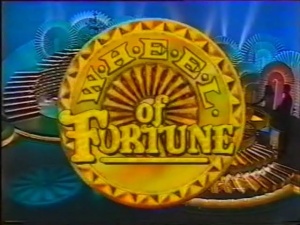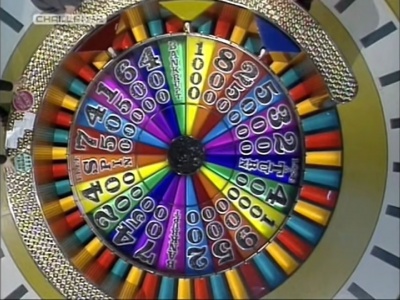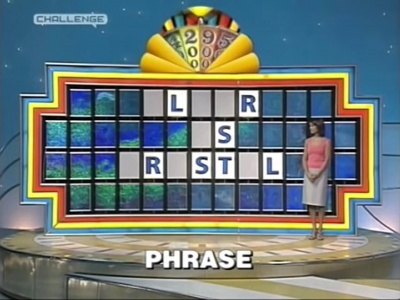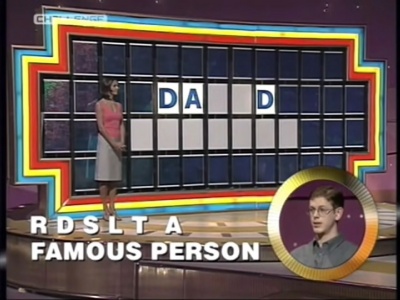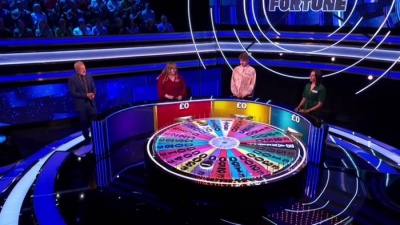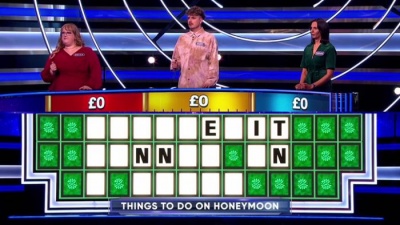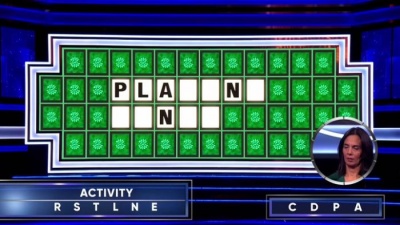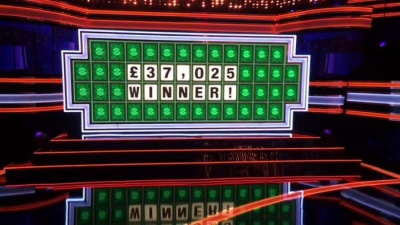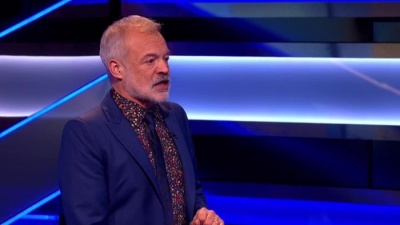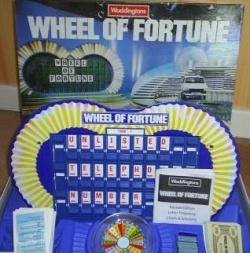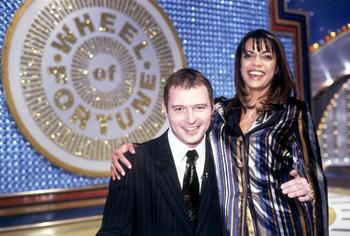Wheel of Fortune (2)
(→Trivia) |
(→Theme music: Thanks to a Tumblr source.) |
||
| (135 intermediate revisions not shown) | |||
| Line 1: | Line 1: | ||
| - | + | [[File:WoF1988.jpg|300px]] | |
<div class="box"> | <div class="box"> | ||
| + | |||
== Host == | == Host == | ||
| + | |||
| + | [[Eamonn Holmes]] (non-broadcast pilot) | ||
[[Nicky Campbell]] (1988-96) | [[Nicky Campbell]] (1988-96) | ||
| Line 8: | Line 11: | ||
[[Bradley Walsh]] (1997) | [[Bradley Walsh]] (1997) | ||
| - | [[John Leslie]] (1998- | + | [[John Leslie]] (1998-2001) |
[[Paul Hendy]] (2001) | [[Paul Hendy]] (2001) | ||
| + | |||
| + | [[Alison Hammond]] (non-broadcast pilot) | ||
| + | |||
| + | [[Graham Norton]] (2024) | ||
== Co-hosts == | == Co-hosts == | ||
| - | + | Angela Ekaette (1988) | |
| - | + | [[Carol Smillie]] (1989-94) | |
| + | |||
| + | [[Jenny Powell]] (1995-2000) | ||
| + | |||
| + | Tracy Shaw (2000, stand-in) | ||
| + | |||
| + | Terri Seymour (2001) | ||
| + | |||
| + | Announcer: Steve Hamilton | ||
== Broadcast == | == Broadcast == | ||
| - | + | Scottish Television for ITV, 19 July 1988 to 21 December 2001 (14 series) | |
| - | + | Whisper North for ITV1, 6 January 2024 to present | |
</div> | </div> | ||
| Line 30: | Line 45: | ||
Everyone likes Hangman, right? Everyone likes spinning carnival wheels also, right? Some idiot genius came up with the idea of combining the two for this worryingly seminal word game. | Everyone likes Hangman, right? Everyone likes spinning carnival wheels also, right? Some idiot genius came up with the idea of combining the two for this worryingly seminal word game. | ||
| - | + | Three contestants stood around the brightly-coloured titular wheel, most of whose segments had on them points values ranging from 150 to 1,000. There was also one "Free Spin" segment, one "Lose A Turn" segment and at least one "Bankrupt" segment. | |
| - | + | <div class="image">[[File:WoFWheel2nd.jpg|400px]]''The star of the show, in its second form (1994-2000).''</div> | |
| + | |||
| + | In each round, there was a puzzle to be solved consisting of a number of words, the letters of which were indicated by white boxes on the puzzle board. The contestants were told how many words were in the puzzle, and what those words made up (e.g. a well-known phrase, or the name of a singer and one of their songs). A general knowledge question was asked on the buzzer to determine who spun the wheel first. That contestant spun the wheel; if it landed on a points value, they could then guess a consonant they thought appeared in the puzzle. If they guessed correctly, every instance of that consonant was revealed on the board, and for each instance, the contestant scored the number of points they had spun (so for example, if they spun 400, guessed 'T' and there were two of this letter, they scored 800 points). They could then spin again, or buy a vowel in the puzzle (at a cost of 250 points for each instance of that vowel), or attempt to solve the puzzle. | ||
| + | |||
| + | If the contestant guessed a letter that was not in the puzzle, they lost their turn and play passed to the next contestant down the line. Turns were also lost by landing on "Lose A Turn" or "Bankrupt", the latter of which also lost the contestant all the points they had scored in the round up to that point. Landing on "Free Spin", however, earned the contestant a token which - if they remembered to play it - allowed them to keep their turn if they guessed a letter that wasn't there, or landed on "Lose A Turn" or "Bankrupt". | ||
| + | |||
| + | <div class="image">[[File:WoFPuzzle.jpg|400px]]''The answer to this puzzle should be clear as crystal... *wink, wink*''</div> | ||
| + | |||
| + | Correctly solving the puzzle won the contestant a prize, which they chose from three options. Four rounds were played in each show - the two rounds after the commercial break being played for double points, and the last round becoming a speed round (with one final spin of the wheel by the host) if time was short. The contestant with the most points at the end won the game and got the chance to solve the final puzzle, while the other two contestants went away with a Wheel of Fortune watch each (and, in some series, the handheld electronic game as well), along with any prizes they had won for solving puzzles. | ||
| + | |||
| + | For the final puzzle, the contestant was told the number of words and the category, and then had to pick five consonants and one vowel. After these letters were revealed on the board, the contestant had 15 seconds to solve the puzzle. If they succeeded, they won the prize they were playing for, which varied over the years (see Trivia below). | ||
| + | |||
| + | <div class="image">[[File:WoFFinal.jpg|400px]]''"David, um, er, um..."''</div> | ||
The brilliant piece of cunning behind this game is that it was in players' interests to keep spinning and accumulating points for as long as possible before guessing what the phrase was to win the round. In this way it looked like the players didn't know what the phrase actually was; viewers at home almost certainly would have got the answer before the contestants on-screen and could enjoy happy minutes and seconds shouting out at it. | The brilliant piece of cunning behind this game is that it was in players' interests to keep spinning and accumulating points for as long as possible before guessing what the phrase was to win the round. In this way it looked like the players didn't know what the phrase actually was; viewers at home almost certainly would have got the answer before the contestants on-screen and could enjoy happy minutes and seconds shouting out at it. | ||
| Line 38: | Line 65: | ||
=== Campbell's corner === | === Campbell's corner === | ||
| - | Most people will associate the game most firmly with | + | Most people will associate the game most firmly with Scot Nicky Campbell, whose easy-going gentle nature brought the show high ratings. The role of the letter-turner (which, incidentally, went to semi-automatic on the US show in 1997) has also earned some degree of celebrity (or should that be notoriety?) from their roles - in particular, former model Carol Smillie is now a mega-celeb thanks to the ''Wheel'' and the recent British appetite for DIY makeover shows. |
<div class="image"><IMG src="/atoz/programmes/w/wheel_of_fortune2/wheel of fortune.jpg" alt="wheel of fortune.jpg" width="225" height="227"> | <div class="image"><IMG src="/atoz/programmes/w/wheel_of_fortune2/wheel of fortune.jpg" alt="wheel of fortune.jpg" width="225" height="227"> | ||
| Line 54: | Line 81: | ||
=== The Leslie generation === | === The Leslie generation === | ||
| - | [[John Leslie]] became the host in 1998, after Bradley left to become a father. Brad's Box became Leslie's Luxury! He'd come a long way since his game show hosting debut | + | [[John Leslie]] became the host in 1998, after Bradley left to become a father. Brad's Box became Leslie's Luxury! He'd come a long way since his game show hosting debut in [[Scavengers]]. John lasted a little longer than Bradley for three years, but only hosted one primetime series as the following year in 1999, the show got the [[Wipeout]] treatment and went daytime with many elements of the show's primetime era removed. A year later in 2000, the show was given a revamped theme tune (as was the case with many other long-running game shows that were given a modernised touch) and it was also the last year that Jenny Powell would be turning the letters on the board. |
| - | <div class="image">< | + | <div class="image">[[File:Wheel of fortune pair.jpg]]''Jenny Powell and [[John Leslie]]''</div> |
| - | ' | + | At the start of 2001, Terri Seymour was the new co-host of the show and she was given her own little section for viewers at home during the advert break called "Terri's Teatime Teaser", which [[Countdown]] would later incorporate into their show when it was extended to 45 minutes from September 2001. |
| - | + | During John's hosting tenure on the show, he was also hosting the Friday editions of ''This Morning'' alongside [[Fern Britton]] since 1999 as Richard and Judy were hosting the editions from Monday to Thursday. When the couple announced that they were leaving the show in the middle of summer 2001, John and Fern were promoted to host the show from Monday to Friday. Unfortunately, this meant that John couldn't continue hosting Wheel of Fortune as the show was filmed in Glasgow and ''This Morning'' was filmed in London. | |
| + | |||
| + | === Hendy's final bow === | ||
| + | |||
| + | After John left the show to concentrate on ''This Morning'', former Children's BBC presenter and [[Don't Try This at Home!]] co-host [[Paul Hendy]] took the reigns. While he was an affable replacement, he didn't quite hit the same wave length that Nicky or John had, but he was definitely more bearable to watch than Bradley. Sadly at this time, the tone of the game shows in the early 2000s were aiming more on drama and tension from the likes of [[Who Wants to be a Millionaire?]]. Scottish Television wasn't really keen to keep the Wheel spinning for another year and axed it at the end of 2001. Surprisingly, Paul Hendy's sole series was repeated during the 2004 Christmas period. You could almost hear ITV shouting "Clear!" in the background. | ||
| + | |||
| + | === Wheel! Of! Norton! === | ||
| + | |||
| + | In 2020, ITV filmed a pilot with [[Alison Hammond]] as host. It would be three years, however, before they gave a new version of the show the green light. Eight one-hour episodes were commissioned from Whisper North - the same company behind the latest revival of [[Jeopardy!]] - and filmed at Dock10 in Salford. Following in the footsteps of Nicky, Bradders et al was [[Graham Norton]]; following in the footsteps of Carol, Jenny et al was... no-one, which we shall get to later. | ||
| + | |||
| + | <div class=image>[[File:Wheel of fortune 2024 the wheel.jpg|400px]]''The new set is surprisingly dark and serious.''</div> | ||
| + | |||
| + | The show now closely resembles the US version: the audience shouts out "Wheel! Of! Fortune!" at the start; a computer-generated board is used rather than the trilons of old; and there are toss-up puzzles. And here's the first problem: there are only three toss-ups in each episode in America, but there are no-less than *twelve* of them here in the UK (three at the start of each part; those in parts one and two worth £500 and those in parts three and four worth £1,000), which is overkill and makes the wheel like a guest at its own party. | ||
| + | |||
| + | <div class=image>[[File:Wheel of fortune 2024 initial puzzle.jpg|400px]]''Fingers on buzzer...for the next 12 times.''</div> | ||
| + | |||
| + | The second problem is the bonus puzzle for the contestant who solves the second regular puzzle. Like in America, the contestant is given R, S, T, L, N and E and must pick three more consonants and one more vowel, and if they solve this puzzle within 10 seconds, they win a holiday. It's not a terrible idea, but it does disrupt the flow of the main game. | ||
| + | |||
| + | <div class=image>[[File:Wheel of fortune 2024 prize puzzle.jpg|400px]]''Ten letters picked, "Playing bingo" the answer they didn't get.''</div> | ||
| + | |||
| + | As ever, whoever has the most money at the end of the main game gets the chance to solve the final puzzle. In another move brought over from Stateside, they first spin a small wheel filled with 24 envelopes, to determine the cash prize they're playing for - between £15,000 and £50,000. Again, they're given R, S, T, L, N and E and pick three more consonants and one more vowel, and if they solve the puzzle in time, they win the cash amount that's in the envelope to go with the money that they won in the main game. | ||
| + | |||
| + | <div class=image>[[File:Wheel of fortune 2024 big winner.jpg|400px]]''Tonight's winnings.''</div> | ||
| + | |||
| + | We've already mentioned two problems, but the biggest problem of all - which is also the biggest problem with Whisper's version of ''Jeopardy!'' - is the padding. There is simply not enough game to fill the hour, the toss-up puzzles and the holiday bonus puzzle included. People watch ''Wheel of Fortune'' to see the wheel being spun and to see the contestants pushing their luck by continuing to spin when they already know the answer to the puzzle, so why can't there be more than just three regular puzzles? The lack of a co-host also hurts; not only does it make the show feel empty but also Norton - great as he is - seems to struggle at various points, which he likely wouldn't do if he had some company. | ||
| + | |||
| + | <div class=image>[[File:Wheel of fortune 2024 graham norton.jpg|400px]]''Ooh, it's our Graham!''</div> | ||
== Key moments == | == Key moments == | ||
| - | + | When you're a game show host, it's always important to get as much information on the contestants as you can from your researchers before the show, and that's exactly what [[Nicky Campbell]] failed to do in an infamous outtake, shown on ''It'll Be Alright on the Night 10''. Nicky did a bit of banter with a contestant about marriage and asked the question "You're getting married soon aren't you?", to which the contestant replied "I'm married now." A second take was made where Campbell rephrased the question to "You got married quite recently didn't you?" and the contestant replied with "Two years ago." | |
| + | |||
| + | An outtake from the [[John Leslie]] era concerned a Royal Navy contestant mishearing John's banter question on if they were based "all over", leading to the contestant assuming Leslie forgot their name. <!-- This moment can also be seen on 'It'll Be Alright on the Night 11'. --> | ||
<div class="image"><IMG src="/atoz/programmes/w/wheel_of_fortune2/outtake.jpg" width="300" height="225" border="0"> | <div class="image"><IMG src="/atoz/programmes/w/wheel_of_fortune2/outtake.jpg" width="300" height="225" border="0"> | ||
| Line 70: | Line 125: | ||
''[[John Leslie]] sees the funny side''</div> | ''[[John Leslie]] sees the funny side''</div> | ||
| - | + | Another outtake from the Leslie era when John Leslie was trying so hard to tell the losing contestants in one episode that they are going home with a Wheel of Fortune watch while also trying to avoid saying "You're not going away empty handed". Needless to say, John couldn't hold back laughing. <!-- This moment can also be seen on 'It's Shouldn't Happen to a... Quiz Show Host' --> | |
| - | + | ||
| - | + | ||
== Catchphrases == | == Catchphrases == | ||
| Line 87: | Line 140: | ||
At the beginning of the show, originally: "Wheeeeel o-o-of Fortune!" followed by: "Your host - Nicky Campbell!" or, in later series: "With Nicky Campbell and Carol Smillie!" | At the beginning of the show, originally: "Wheeeeel o-o-of Fortune!" followed by: "Your host - Nicky Campbell!" or, in later series: "With Nicky Campbell and Carol Smillie!" | ||
| + | |||
| + | Paul Hendy signing off: 'If you've enjoyed the show, I've been Paul Hendy. If not, I've been [insert other game show host]!' | ||
== Inventor == | == Inventor == | ||
| Line 94: | Line 149: | ||
== Theme music == | == Theme music == | ||
| - | The theme is called ''Spin to Win'' by David Pringle and Bobbie Heatlie. | + | The original theme is called ''Spin to Win'' by David Pringle and Bobbie Heatlie. Mr. Heatlie had earlier written the festive standard "Merry Christmas everyone" for Shakin' Stevens. |
| - | + | ||
| - | + | ||
| - | + | There was no credit for the theme on the 2024 revival; the tune is "Changing Keys" from the Bleeding Fingers Music company, as used on ''Celebrity Wheel of Fortune'' in the USA. | |
== Trivia == | == Trivia == | ||
Possibly the first ever show to use male models ("Prize Guys") to display the prizes. | Possibly the first ever show to use male models ("Prize Guys") to display the prizes. | ||
| - | |||
| - | |||
Tracy Shaw did a one week stint as co-host to celebrate the 40th anniversary of Coronation Street. | Tracy Shaw did a one week stint as co-host to celebrate the 40th anniversary of Coronation Street. | ||
| + | |||
| + | The original host, Angela Ekaette, got the job because Scottish Television were worried about having two Scottish presenters for their first network commission. | ||
| + | |||
| + | Terri Seymour's "permacroak" was caused by damage to her larynx as a result of lupus. | ||
| + | |||
| + | One man managed to spin the wheel the wrong way. It ruined the mechanism and the studio technicians spent hours trying to get it to work again. | ||
| + | |||
| + | === Jackpot! === | ||
| + | |||
| + | In the first five series (1988-93), the contestant who got the chance to solve the final puzzle had a choice of three prizes to play for: a car, a holiday, or the "Big Wheel Jackpot". This last prize was £3,000 in the first series, before increasing to £4,000 in the second series (1989). This, in fact, was the biggest cash prize offered on a British TV game show at the time, beating (we believe) the £3,200 offered on the original ''[[Lingo]]'' the previous year. It didn't hold the record for long, however, before ''[[The 64,000 Dollar Question|The $64,000 Question]]'' came along in 1990 with its £6,400 top prize! Nonetheless, the "Big Wheel Jackpot" remained at £4,000 through the third and fourth series (1991-92), then increased to £5,000 in the fifth series (1993). | ||
| + | |||
| + | Following the 1993 abolition of the prize limits on game shows, the sixth series (1994) brilliantly offered a car ''and'' £10,000. Occasionally a second car would be thrown in as well, to make what must have been one of the biggest prize packages offered on a British TV game show up to that point. | ||
| + | |||
| + | The money was increased to £20,000 from 1995-1998, with the winning contestant randomly selecting the prize by choosing one of two sealed envelopes. | ||
| + | |||
| + | During the daytime series, winners of each round were able to choose from an array of prizes laid out in the studio, such as a CD player, dishwasher etc. The cash prize for the final was dropped to £2000. | ||
| + | |||
| + | ===Regional transmission details=== | ||
| + | |||
| + | For the first ten series, the show was broadcast once a week in a primetime slot. For the eleventh series, the programme was moved to a five-shows-a-week daytime slot and it aired at 2.40 each afternoon from 2 March, after the sixth series of Dale's [[Supermarket Sweep]] concluded its run. It took a break from 28 May to 10 September 1999. The twelfth series began at the start of the year and lasted until the start of December. During this series, the show's slot varied in different ITV regions. Carlton (London and Westcountry), Grampian and Scottish broadcast it at 5.30. Anglia, Border, Granada, Meridian, Yorkshire, Tyne Tees and Ulster aired it at 1.30 until 31 March 2000, then Friday afternoons only from 18 May to 9 June. Then, from 12 June, it was moved back to five-times-a-week; from 17 July, it was moved to 2.40, so not all the episodes aired. HTV followed Anglia's pattern until 8 May before switching to the 5.30 slot. Carlton (Central) also followed Anglia's pattern until 12 June before moving the show to 5.30. Additional episodes were broadcast by all ITV regions on Sundays during May. During the thirteenth series, all ITV regions broadcast episodes at 5.30 from 2 January to 22 June 2001, before being switched to a Saturday afternoon slot until 4 August 2001. The final thirty episodes (series fourteen) were also networked at 2.40, from 12 November to 21 December. | ||
== Merchandise == | == Merchandise == | ||
| - | Waddingtons produced a tie-in board game, which rather bizarrely didn't actually mention that it was based on the TV show. | + | Waddingtons produced a tie-in board game, which rather bizarrely didn't actually mention that it was based on the TV show. Despite this, it was given away to losing contestants as a consolation prize during one series, accompanying the ever-present 'Wheel of Fortune' watch! |
<div class="image">[[Image:Wheel of fortune board game.jpg|250px]]''The Waddingtons board game''</div> | <div class="image">[[Image:Wheel of fortune board game.jpg|250px]]''The Waddingtons board game''</div> | ||
| - | An LCD handheld game was also available. | + | An LCD handheld game was also available. This was also given away with the aforementioned watch to losing contestants across a number of series. |
== Web links == | == Web links == | ||
| - | [http://en.wikipedia.org/wiki/ | + | [http://en.wikipedia.org/wiki/Wheel_of_Fortune_(UK_game_show) Wikipedia entry] |
| + | |||
| + | == Pictures == | ||
| + | |||
| + | <div class="image">[[File:Wheel_of_fortune_pair2.jpg]]''Oh, it's them again! What were their names?''</div> | ||
| + | |||
| + | == See also == | ||
| + | |||
| + | [[Weaver's Week 2024-01-28|Weaver's Week review]] (2024) | ||
[[Category:Puzzle]] | [[Category:Puzzle]] | ||
| Line 124: | Line 203: | ||
[[Category:STV Productions]] | [[Category:STV Productions]] | ||
[[Category:Action Time Productions]] | [[Category:Action Time Productions]] | ||
| + | [[Category:Current]] | ||
Current revision as of 19:39, 29 January 2024
Contents |
Host
Eamonn Holmes (non-broadcast pilot)
Nicky Campbell (1988-96)
Bradley Walsh (1997)
John Leslie (1998-2001)
Paul Hendy (2001)
Alison Hammond (non-broadcast pilot)
Graham Norton (2024)
Co-hosts
Angela Ekaette (1988)
Carol Smillie (1989-94)
Jenny Powell (1995-2000)
Tracy Shaw (2000, stand-in)
Terri Seymour (2001)
Announcer: Steve Hamilton
Broadcast
Scottish Television for ITV, 19 July 1988 to 21 December 2001 (14 series)
Whisper North for ITV1, 6 January 2024 to present
Synopsis
Everyone likes Hangman, right? Everyone likes spinning carnival wheels also, right? Some idiot genius came up with the idea of combining the two for this worryingly seminal word game.
Three contestants stood around the brightly-coloured titular wheel, most of whose segments had on them points values ranging from 150 to 1,000. There was also one "Free Spin" segment, one "Lose A Turn" segment and at least one "Bankrupt" segment.
In each round, there was a puzzle to be solved consisting of a number of words, the letters of which were indicated by white boxes on the puzzle board. The contestants were told how many words were in the puzzle, and what those words made up (e.g. a well-known phrase, or the name of a singer and one of their songs). A general knowledge question was asked on the buzzer to determine who spun the wheel first. That contestant spun the wheel; if it landed on a points value, they could then guess a consonant they thought appeared in the puzzle. If they guessed correctly, every instance of that consonant was revealed on the board, and for each instance, the contestant scored the number of points they had spun (so for example, if they spun 400, guessed 'T' and there were two of this letter, they scored 800 points). They could then spin again, or buy a vowel in the puzzle (at a cost of 250 points for each instance of that vowel), or attempt to solve the puzzle.
If the contestant guessed a letter that was not in the puzzle, they lost their turn and play passed to the next contestant down the line. Turns were also lost by landing on "Lose A Turn" or "Bankrupt", the latter of which also lost the contestant all the points they had scored in the round up to that point. Landing on "Free Spin", however, earned the contestant a token which - if they remembered to play it - allowed them to keep their turn if they guessed a letter that wasn't there, or landed on "Lose A Turn" or "Bankrupt".
Correctly solving the puzzle won the contestant a prize, which they chose from three options. Four rounds were played in each show - the two rounds after the commercial break being played for double points, and the last round becoming a speed round (with one final spin of the wheel by the host) if time was short. The contestant with the most points at the end won the game and got the chance to solve the final puzzle, while the other two contestants went away with a Wheel of Fortune watch each (and, in some series, the handheld electronic game as well), along with any prizes they had won for solving puzzles.
For the final puzzle, the contestant was told the number of words and the category, and then had to pick five consonants and one vowel. After these letters were revealed on the board, the contestant had 15 seconds to solve the puzzle. If they succeeded, they won the prize they were playing for, which varied over the years (see Trivia below).
The brilliant piece of cunning behind this game is that it was in players' interests to keep spinning and accumulating points for as long as possible before guessing what the phrase was to win the round. In this way it looked like the players didn't know what the phrase actually was; viewers at home almost certainly would have got the answer before the contestants on-screen and could enjoy happy minutes and seconds shouting out at it.
Campbell's corner
Most people will associate the game most firmly with Scot Nicky Campbell, whose easy-going gentle nature brought the show high ratings. The role of the letter-turner (which, incidentally, went to semi-automatic on the US show in 1997) has also earned some degree of celebrity (or should that be notoriety?) from their roles - in particular, former model Carol Smillie is now a mega-celeb thanks to the Wheel and the recent British appetite for DIY makeover shows.
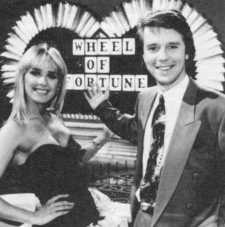 Carol Smillie and Nicky Campbell
Carol Smillie and Nicky CampbellBrad's Box!?
When Campbell left to pursue other interests, mainly going back to his DJ roots, seaside-comedian-type Bradley Walsh was introduced to the show in 1997. A few innovations were added to the format, such as Brad's Box - a special on-the-spot prize (for landing on a certain square) which was in... er... a box.
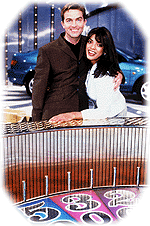 Bradley Walsh and Jenny Powell
Bradley Walsh and Jenny PowellThe Leslie generation
John Leslie became the host in 1998, after Bradley left to become a father. Brad's Box became Leslie's Luxury! He'd come a long way since his game show hosting debut in Scavengers. John lasted a little longer than Bradley for three years, but only hosted one primetime series as the following year in 1999, the show got the Wipeout treatment and went daytime with many elements of the show's primetime era removed. A year later in 2000, the show was given a revamped theme tune (as was the case with many other long-running game shows that were given a modernised touch) and it was also the last year that Jenny Powell would be turning the letters on the board.
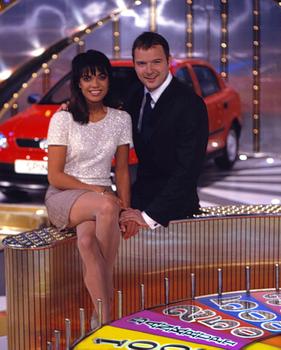 Jenny Powell and John Leslie
Jenny Powell and John LeslieAt the start of 2001, Terri Seymour was the new co-host of the show and she was given her own little section for viewers at home during the advert break called "Terri's Teatime Teaser", which Countdown would later incorporate into their show when it was extended to 45 minutes from September 2001.
During John's hosting tenure on the show, he was also hosting the Friday editions of This Morning alongside Fern Britton since 1999 as Richard and Judy were hosting the editions from Monday to Thursday. When the couple announced that they were leaving the show in the middle of summer 2001, John and Fern were promoted to host the show from Monday to Friday. Unfortunately, this meant that John couldn't continue hosting Wheel of Fortune as the show was filmed in Glasgow and This Morning was filmed in London.
Hendy's final bow
After John left the show to concentrate on This Morning, former Children's BBC presenter and Don't Try This at Home! co-host Paul Hendy took the reigns. While he was an affable replacement, he didn't quite hit the same wave length that Nicky or John had, but he was definitely more bearable to watch than Bradley. Sadly at this time, the tone of the game shows in the early 2000s were aiming more on drama and tension from the likes of Who Wants to be a Millionaire?. Scottish Television wasn't really keen to keep the Wheel spinning for another year and axed it at the end of 2001. Surprisingly, Paul Hendy's sole series was repeated during the 2004 Christmas period. You could almost hear ITV shouting "Clear!" in the background.
Wheel! Of! Norton!
In 2020, ITV filmed a pilot with Alison Hammond as host. It would be three years, however, before they gave a new version of the show the green light. Eight one-hour episodes were commissioned from Whisper North - the same company behind the latest revival of Jeopardy! - and filmed at Dock10 in Salford. Following in the footsteps of Nicky, Bradders et al was Graham Norton; following in the footsteps of Carol, Jenny et al was... no-one, which we shall get to later.
The show now closely resembles the US version: the audience shouts out "Wheel! Of! Fortune!" at the start; a computer-generated board is used rather than the trilons of old; and there are toss-up puzzles. And here's the first problem: there are only three toss-ups in each episode in America, but there are no-less than *twelve* of them here in the UK (three at the start of each part; those in parts one and two worth £500 and those in parts three and four worth £1,000), which is overkill and makes the wheel like a guest at its own party.
The second problem is the bonus puzzle for the contestant who solves the second regular puzzle. Like in America, the contestant is given R, S, T, L, N and E and must pick three more consonants and one more vowel, and if they solve this puzzle within 10 seconds, they win a holiday. It's not a terrible idea, but it does disrupt the flow of the main game.
As ever, whoever has the most money at the end of the main game gets the chance to solve the final puzzle. In another move brought over from Stateside, they first spin a small wheel filled with 24 envelopes, to determine the cash prize they're playing for - between £15,000 and £50,000. Again, they're given R, S, T, L, N and E and pick three more consonants and one more vowel, and if they solve the puzzle in time, they win the cash amount that's in the envelope to go with the money that they won in the main game.
We've already mentioned two problems, but the biggest problem of all - which is also the biggest problem with Whisper's version of Jeopardy! - is the padding. There is simply not enough game to fill the hour, the toss-up puzzles and the holiday bonus puzzle included. People watch Wheel of Fortune to see the wheel being spun and to see the contestants pushing their luck by continuing to spin when they already know the answer to the puzzle, so why can't there be more than just three regular puzzles? The lack of a co-host also hurts; not only does it make the show feel empty but also Norton - great as he is - seems to struggle at various points, which he likely wouldn't do if he had some company.
Key moments
When you're a game show host, it's always important to get as much information on the contestants as you can from your researchers before the show, and that's exactly what Nicky Campbell failed to do in an infamous outtake, shown on It'll Be Alright on the Night 10. Nicky did a bit of banter with a contestant about marriage and asked the question "You're getting married soon aren't you?", to which the contestant replied "I'm married now." A second take was made where Campbell rephrased the question to "You got married quite recently didn't you?" and the contestant replied with "Two years ago."
An outtake from the John Leslie era concerned a Royal Navy contestant mishearing John's banter question on if they were based "all over", leading to the contestant assuming Leslie forgot their name.
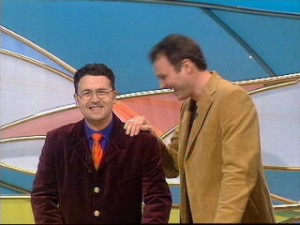 John Leslie sees the funny side
John Leslie sees the funny sideAnother outtake from the Leslie era when John Leslie was trying so hard to tell the losing contestants in one episode that they are going home with a Wheel of Fortune watch while also trying to avoid saying "You're not going away empty handed". Needless to say, John couldn't hold back laughing.
Catchphrases
Sign off towards the break - "We'll see you in the spin of a wheel" followed by that hand movement.
At the end of the show: "We'll see you next time around!"
"One spin of this wheel could mean a possible fortune!"
"Let's call up the bank..."
"It's time to leave this wheel behind and go for a possible fortune!" This was later shortened to: "Let's go for that fortune!"
At the beginning of the show, originally: "Wheeeeel o-o-of Fortune!" followed by: "Your host - Nicky Campbell!" or, in later series: "With Nicky Campbell and Carol Smillie!"
Paul Hendy signing off: 'If you've enjoyed the show, I've been Paul Hendy. If not, I've been [insert other game show host]!'
Inventor
From the original US game Wheel of Fortune, devised by Merv Griffin.
Theme music
The original theme is called Spin to Win by David Pringle and Bobbie Heatlie. Mr. Heatlie had earlier written the festive standard "Merry Christmas everyone" for Shakin' Stevens.
There was no credit for the theme on the 2024 revival; the tune is "Changing Keys" from the Bleeding Fingers Music company, as used on Celebrity Wheel of Fortune in the USA.
Trivia
Possibly the first ever show to use male models ("Prize Guys") to display the prizes.
Tracy Shaw did a one week stint as co-host to celebrate the 40th anniversary of Coronation Street.
The original host, Angela Ekaette, got the job because Scottish Television were worried about having two Scottish presenters for their first network commission.
Terri Seymour's "permacroak" was caused by damage to her larynx as a result of lupus.
One man managed to spin the wheel the wrong way. It ruined the mechanism and the studio technicians spent hours trying to get it to work again.
Jackpot!
In the first five series (1988-93), the contestant who got the chance to solve the final puzzle had a choice of three prizes to play for: a car, a holiday, or the "Big Wheel Jackpot". This last prize was £3,000 in the first series, before increasing to £4,000 in the second series (1989). This, in fact, was the biggest cash prize offered on a British TV game show at the time, beating (we believe) the £3,200 offered on the original Lingo the previous year. It didn't hold the record for long, however, before The $64,000 Question came along in 1990 with its £6,400 top prize! Nonetheless, the "Big Wheel Jackpot" remained at £4,000 through the third and fourth series (1991-92), then increased to £5,000 in the fifth series (1993).
Following the 1993 abolition of the prize limits on game shows, the sixth series (1994) brilliantly offered a car and £10,000. Occasionally a second car would be thrown in as well, to make what must have been one of the biggest prize packages offered on a British TV game show up to that point.
The money was increased to £20,000 from 1995-1998, with the winning contestant randomly selecting the prize by choosing one of two sealed envelopes.
During the daytime series, winners of each round were able to choose from an array of prizes laid out in the studio, such as a CD player, dishwasher etc. The cash prize for the final was dropped to £2000.
Regional transmission details
For the first ten series, the show was broadcast once a week in a primetime slot. For the eleventh series, the programme was moved to a five-shows-a-week daytime slot and it aired at 2.40 each afternoon from 2 March, after the sixth series of Dale's Supermarket Sweep concluded its run. It took a break from 28 May to 10 September 1999. The twelfth series began at the start of the year and lasted until the start of December. During this series, the show's slot varied in different ITV regions. Carlton (London and Westcountry), Grampian and Scottish broadcast it at 5.30. Anglia, Border, Granada, Meridian, Yorkshire, Tyne Tees and Ulster aired it at 1.30 until 31 March 2000, then Friday afternoons only from 18 May to 9 June. Then, from 12 June, it was moved back to five-times-a-week; from 17 July, it was moved to 2.40, so not all the episodes aired. HTV followed Anglia's pattern until 8 May before switching to the 5.30 slot. Carlton (Central) also followed Anglia's pattern until 12 June before moving the show to 5.30. Additional episodes were broadcast by all ITV regions on Sundays during May. During the thirteenth series, all ITV regions broadcast episodes at 5.30 from 2 January to 22 June 2001, before being switched to a Saturday afternoon slot until 4 August 2001. The final thirty episodes (series fourteen) were also networked at 2.40, from 12 November to 21 December.
Merchandise
Waddingtons produced a tie-in board game, which rather bizarrely didn't actually mention that it was based on the TV show. Despite this, it was given away to losing contestants as a consolation prize during one series, accompanying the ever-present 'Wheel of Fortune' watch!
An LCD handheld game was also available. This was also given away with the aforementioned watch to losing contestants across a number of series.
Web links
Pictures
See also
Weaver's Week review (2024)

